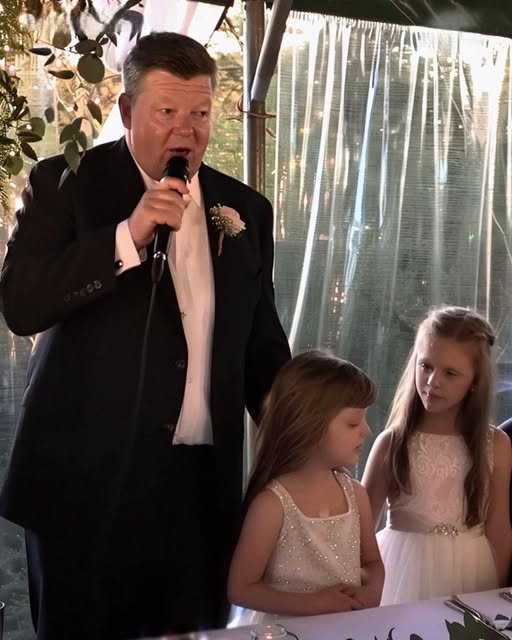It was the kind of event where everything felt almost too polished, so flawless it made you uneasy, as if perfection was a mask hiding inevitable cracks. I should have trusted that instinct.
I stood with Tommy and Jessica, trying to look as if I belonged, when my father raised his champagne glass. His smile was broad, the kind that stretched wider than I’d seen in years. He spoke with warmth about his new wife, Sarah, praising her as if she were the center of his universe. The guests sighed with admiration. Then he turned to Sarah’s two daughters, Emma and Sophie, who giggled in their matching dresses. His eyes lit up with tenderness as he told them he couldn’t wait to be their father, that he already loved them dearly.
My chest tightened as I braced myself for him to turn to us, to say something about his actual children. And he did—for Tommy and Jessica. He told them how proud he was of their maturity, how grateful he was for their support. Then his gaze shifted to me. His smile sharpened, his voice turned cold, and with every guest watching, he said the words that broke me: “Stephanie, as for you… I just hope you’ll be out of my life soon and won’t ruin this marriage like you ruined the last one.”
The silence that followed was suffocating. The words didn’t just sting—they crushed me. I felt exposed, humiliated, gutted in front of his new family, his friends, everyone. I couldn’t breathe. My chair screeched against the floor as I stood, and the sound echoed louder than his voice. Every head turned toward me. I didn’t look at him. I couldn’t. Instead, I walked straight out.
Outside, the air was cool, but I was shaking. My brother Tommy followed me, pale and worried, but before he could comfort me, relatives came rushing out. My aunt scolded me for “making a scene.” My uncle insisted my father was “just joking.” Their words twisted the knife deeper. They told me to go back inside, to pretend it hadn’t happened. I refused. I called my mother instead, my voice breaking as I begged her to come get me.
She arrived twenty minutes later. I climbed into her car without a word, and she didn’t ask questions. At home, she made me a sandwich, put on an old comedy, and simply held me as I cried until I had nothing left. Days later, when I could finally speak without shaking, I asked her if what he’d said was true—if I really had ruined their marriage.
Her eyes were heavy with guilt as she told me the truth. My father had wanted to give me up after Tommy and Jessica were born. He hadn’t wanted custody of me at all. He only fought for me in the divorce, she admitted, because it saved him from paying child support. Hearing it was like being hit by ice water. All those years, all those moments where I wondered why he treated me differently, it all made sense.
It’s been three weeks since that day. My father hasn’t called, hasn’t texted, hasn’t asked about me once. My siblings still visit him, but according to Tommy, my name never comes up. Meanwhile, his family keeps sending me messages accusing me of ruining his wedding, telling me I was selfish, dramatic, that I owe him an apology.
But I know better now. When your own father tells you in front of a room full of people that you ruined his life and that he wants you gone, leaving is the only choice. Staying silent and pretending it didn’t hurt—that would’ve been the real betrayal of myself.
For years, I tried to make excuses for him, tried to believe he loved me in his own way. But the truth is clear now: he never wanted me. That isn’t a reflection of my worth—it’s a reflection of his failure. He chose bitterness, cruelty, and blame. And finally, I’m done carrying that weight.
It took his wedding speech for me to see it, but now I know: I didn’t ruin anything. I was never the problem. He was.

